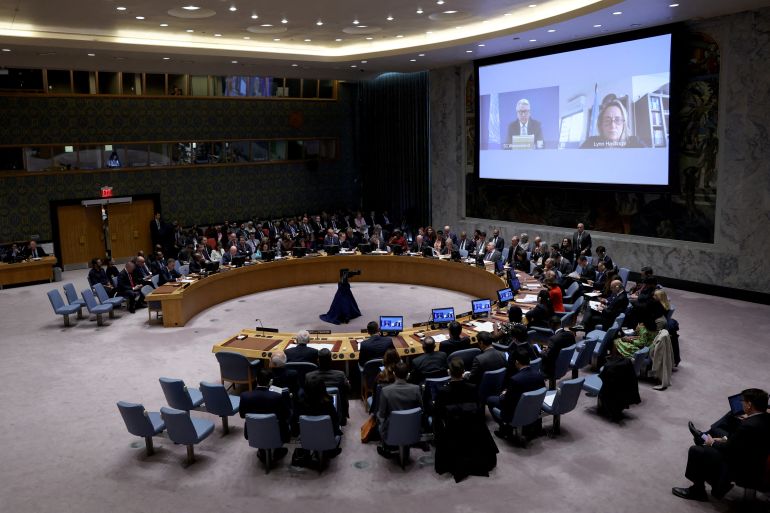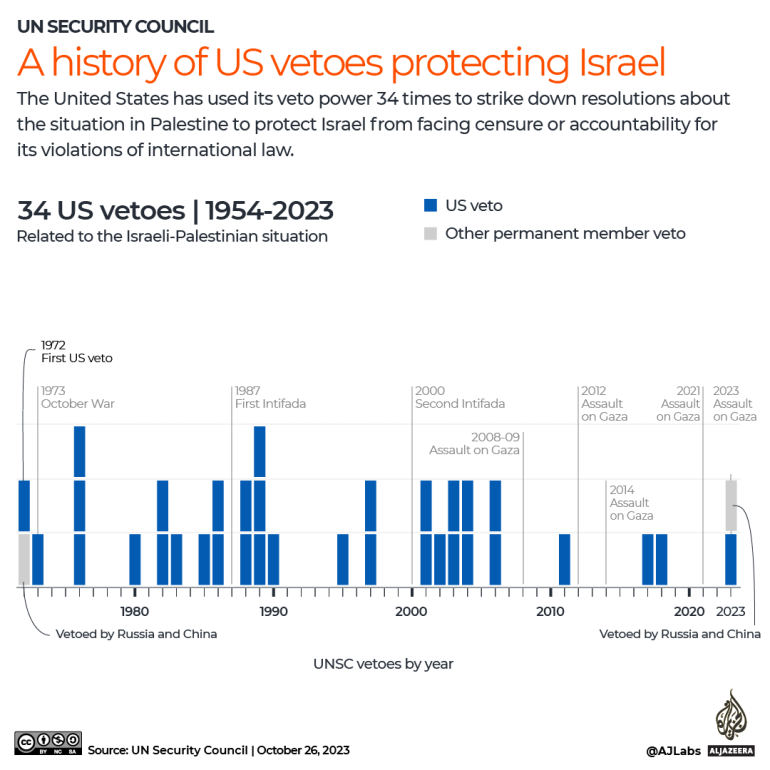How the US has used its veto power at the UN in support of Israel
The United States has used its veto power at least 34 times to block UN Security Council resolutions that were critical of Israel.

The United Nations Security Council failed to adopt a resolution on the ongoing situation in Gaza after two competing draft resolutions were rejected by member states on Wednesday.
Russia and China vetoed a US-drafted resolution that called for “humanitarian pauses” and Israel’s right to defend itself. A second draft resolution sponsored by Russia, which called for a humanitarian ceasefire, failed to garner enough votes to pass. The United States was expected to veto the resolution had it garnered enough votes to put it on the path to approval.
Keep reading
list of 4 itemsHamas chief Haniyeh discusses Gaza truce talks with Egypt, Qatar officials
Paris’s Sciences Po rejects protesters’ demand to review Israel ties
‘Diaspora Jews think Judaism is more important than Zionism’
The two resolutions were put to vote on Wednesday at the UN headquarters in New York after an intense open debate by members on “the situation in the Middle East, including the Palestinian question”.
This was the second UNSC draft resolution put to vote since the Israel-Palestine war started three weeks ago. The first one was held on October 18, when the US blocked a resolution calling for “humanitarian pauses”. Twelve countries voted in favour.
A history of US vetoes protecting Israel
The US response to the UNSC resolutions amid this conflict is in line with its historical use of its veto power to block any resolutions that might be critical of Israel or call for Palestinian statehood.
Since 1945, a total of 36 UNSC draft resolutions related to Israel-Palestine have been vetoed by one of the five permanent members – the US, Russia, China, the United Kingdom, and France. Out of these, 34 were vetoed by the US and two by Russia and China.
The majority of these resolutions were drafted to provide a framework for peace in the decades-long Israel-Palestine conflict, including asking Israel to adhere to international laws, calling for self-determination for Palestinian statehood, or condemning Israel for the displacement of Palestinians or settlement building in occupied Palestinian territories.

The US has vetoed resolutions on Israel a total of 46 times, including over Israel’s invasion of southern Lebanon as well as Israel’s annexation of the Syrian Golan Heights, which remains under Israeli occupation. Washington formally recognised Israeli sovereignty in 2019 over the Golan Heights, reversing decades of US policy.
The 1972 draft resolution – the only time the US did not veto – was brief and generic, calling upon all sides to “cease immediately all military operations and to exercise the greatest restraint in the interest of international peace and security”.
Key resolutions blocked by the US
- The October 18, 2023 resolution calling for “humanitarian pauses” and for Israel to rescind its evacuation order for northern Gaza was blocked. The US ambassador to the UN said: “Yes, resolutions are important, and yes, this Council must speak out. But the actions we take must be informed by the facts on the ground and support direct diplomacy that can save lives.”
- After the Great March of Return, in 2018, the UNSC drafted a resolution condemning “the use of any excessive, disproportionate and indiscriminate force by the Israeli forces against Palestinian civilians” and calling for “lasting, comprehensive peace” with “two democratic States, Israel and Palestine”. The US vetoed the resolution, with then-US Ambassador to the UN Nikki Haley saying it presented “a grossly one-sided view of what has taken place in Gaza in recent weeks”.
- After the US recognised Jerusalem as Israel’s capital in 2017, a draft resolution said “actions which purport to have altered the character, status or demographic composition of the Holy City of Jerusalem have no legal effect, are null and void”. It demanded the status of Jerusalem to be determined in line with UN regulations. All of the 15 UNSC members voted in favour except the US, which vetoed it.
- Following the second Intifada or uprising that started in 2000, a UNSC resolution expressed “grave concern at the continuation of the tragic and violent events that have taken place since September 2000”, condemned attacks against civilians and called for Israel “to abide scrupulously by its legal obligations and responsibilities under the Fourth Geneva Convention”. Then-US Ambassador to the UN John Negroponte said the resolution intended to “isolate politically one of the parties to the conflict through an attempt to throw the weight of the Council behind the other party”. Twelve countries voted in favour, but the US vetoed.